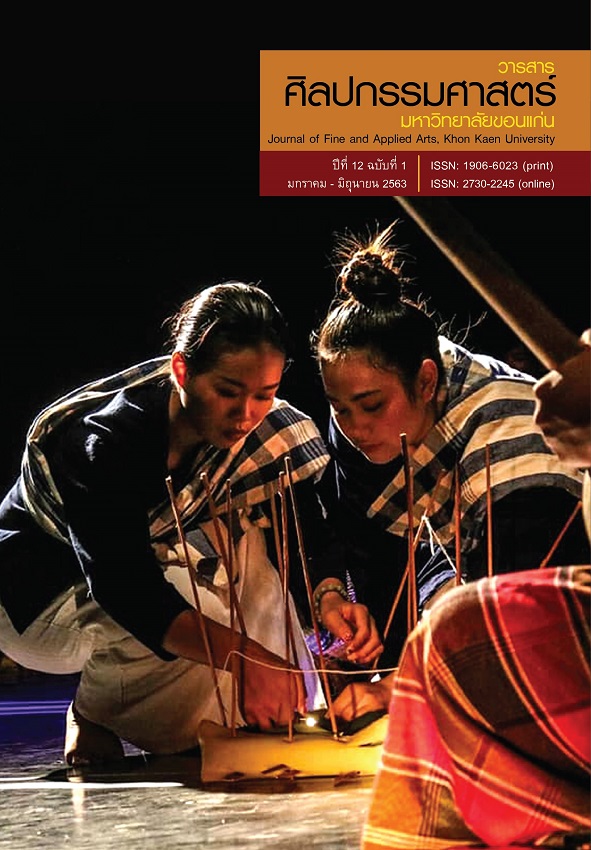The Development of Beat and Rhythmic Pattern Skill Exercises for Trumpet Students in Secondary School
Main Article Content
Abstract
The main objectives of this research are to develop a skill exercises for beat and rhythm patterns of trumpet student in secondary school and to study the result of beat and rhythm training that affects the score of beat and rhythm training in secondary trumpet students. Two secondary students were chosen for specific sample group. The research methods used in this research, were case-study and qualitative methodology. The experiment was categorized into 3 periods, which were 1) The observation of participants’ behaviour (Baseline A), 2) Activities to develop beat and rhythmic patterns (Treatment B), and 3) The Follow-up of implementation (Follow-up C). The experiment collected data and information from evaluation and behaviour observation for 12 times.
The results show that students have consistently good score in beat and rhythm patterns skill when compared the score in each experiment period. To conclude, the beat and rhythm pattern skill training that researcher has conducted makes students gain higher score.
Article Details
Content and information in articles published in the Journal of Fine and Applied Arts of Khon Kaen University is regarded as the opinion and sole responsibility of the author(s) directly; therefore, editors are not obliged to agree to or share any responsibility with regard to the content and information that appears within these articles.
All articles, information, content, image, etc. that have been published in the Journal of Fine and Applied Arts of Khon Kaen University is the copyright of the Journal of Fine and Appllied Arts of Khon Kaen University. Any person or organization who wishes to distribute all or parts of the articles for further dissemination or other usage must first receive permission from the Journal of Fine and Applied Arts of Khon Kaen University before proceeding to do so.
References
ชาลินี สุริยนเปล่งแสง. (2554). ชุดการเรียนรู้ด้วยตนเองสำหรับครูปฐมวัย สาระการเรียนรู้ดนตรีองค์ประกอบดนตรีด้านจังหวะ. วิทยานิพนธ์ปริญญาศิลปศาสตรมหาบัณฑิต สาขาดนตรีศึกษา วิทยาลัยดุริยางคศิลป์ มหาวิทยาลัยมหิดล.
ณัชชา โสคติยานุรักษ์. (2550). ดนตรีคลาสสิก: ศัพท์สำคัญ. กรุงเทพฯ: สํานักพิมพ์แห่งจุฬาลงกรณ์มหาวิทยาลัย.
ทิศนา แขมมณี. (2557). ศาสตร์การสอน: องค์ความรู้เพื่อการจัดกระบวนการเรียนรู้ที่มีประสิทธิภาพ. พิมพ์ครั้ที่ 18. กรุงเทพฯ: จุฬาลงกรณ์มหาวิทยาลัย.
ธนาคาร แพทย์วงษ์. (2554). วงโยธวาทิต. ค้นเมื่อ 20 ตุลาคม 2561 จาก http://kruthanakhan.blogspot.com/ 2011/08/blog-post_02.html
พรพรรณ แก่นอำพรพันธ์. (2550). ชุดการสอนวิชาดนตรีสำหรับเด็กปฐมวัยเรื่องระดับเสียงและจังหวะ. วิทยานิพนธ์ปริญญาศิลปศาสตรมหาบัณฑิต สาขาดนตรี บัณฑิตวิทยาลัย มหาวิทยาลัยมหิดล.
พรสุรัช อินต๊ะขันท์. (2556). ชุดการสอนซ่อมเสริมทักษะเรื่องจังหวะหลักคงที่และกระสวนจังหวะสำหรับนักเรียนเปียโนระดับชั้นต้นในช่วงอายุ 6-9 ปี. วิทยานิพนธ์ปริญญาศิลปศาสตรมหาบัณฑิต สาขาดนตรี วิทยาลัยดุริยางคศิลป์ มหาวิทยาลัยมหิดล.
วิภาวดี นครขวาง. (2551) ชุดการจัดกิจกรรมดนตรีสำหรับเด็กปฐมวัยเรื่องจังหวะ. วิทยานิพนธ์ปริญญา
ศิลปศาสตรมหาบัณฑิต สาขาดนตรี วิทยาลัยดุริยางคศิลป์ มหาวิทยาลัยมหิดล.
ศิวพงษ์ สาระรัตน. (2559) การพัฒนาบทเรียนบนเว็บ โดยใช้เทคนิคการสอนหมวกหกใบ ร่วมกับสแคฟโฟลดิ้งที่ส่งเสริมทักษะปฏิบัติสำหรับนักเรียนชั้นมัธยมศึกษาตอนต้น. วิทยานิพนธ์ปริญญาครุศาสตรมหาบัณฑิต สาขาคอมพิวเตอร์ศึกษา บัณฑิตวิทยาลัย มหาวิทยาลัยราชภัฏมหาสารคาม.
สมศักดิ์ สร้อยระย้า. (2543). รายงานการวิจัยเรื่องรูปแบบวิธีการอ่านจังหวะ. กรุงเทพฯ: คณะนาฏศิลป์และดุริยางค์ สถาบันเทคโนโลยีราชมงคล.
Bruner, J. S. (1963). The process of education. New York: Vintage Books.
Creswell, J. W. (2008). Educational research: Planning, conducting, and evaluating quantitative and qualitative research. Upper Saddle River, NJ: Pearson/Merrill Prentice Hall.
Creswell, J. W. (2012). Educational research: Planning, conducting, and evaluating quantitative and qualitative research. 4th ed. Upper Saddle River, NJ: Merrill.
Fitts, P. M. (1964). Perceptual-motor skill learning. In: A. W. Melton (Ed.). Categories of human learning. (pp. 243-285). New York: Academic Press.
Flohr, J. W. (2005). Musical lives of young children. Upper Saddle River, NJ: Pearson Prentice.
Gordon, E. (2003). A music learning theory for newborn and young children. Chicago: GIA Publications.
Harber, R.N. (1975). An introduction to psychology. New York: Holt Rinehart and Winston.
Mason, E. & Bramble, W. (1997). Research in Education and the Behavioral Sciences. Madison, WI: Brown & Benchmark Publishers.
Rainbow, E. L. & Owen, D. (1979). A progress report on a three year investigation of the rhythmic ability of pre-school aged children. Bulletin of the Council for Research in Music Education, (59), 84–86.
Scheuzger, A. (2006). The effects of specific transfer activities on fifth grade orchestra and band students’ rhythmic performance. Doctor of Philosophy Dissertation in Music, Graduate School, Ohio State University.
Swanson, R. B. (1969). Music in the education of children. 3rd ed. Belmont, CA: Wadsworth Publishing.
Wiltshire, E. (2006). The effects of visual and aural congruence on the sight-reading of music notation. Doctor of Philosophy Dissertation, School of Music, University of Washington.


